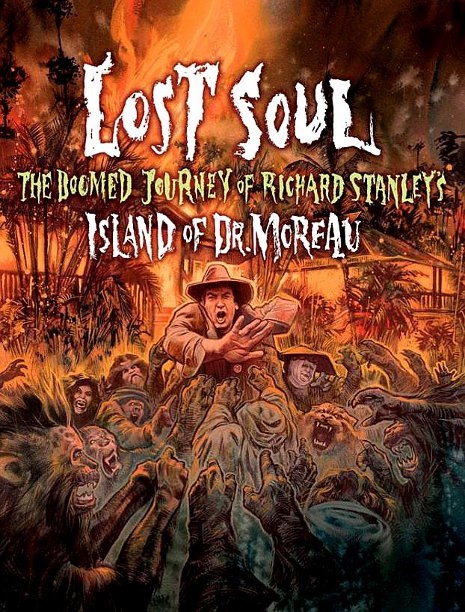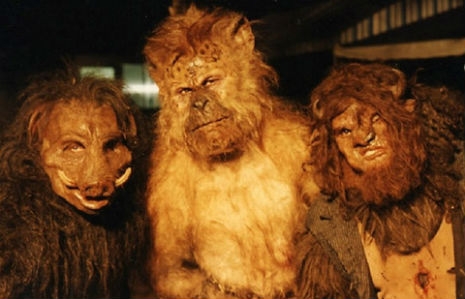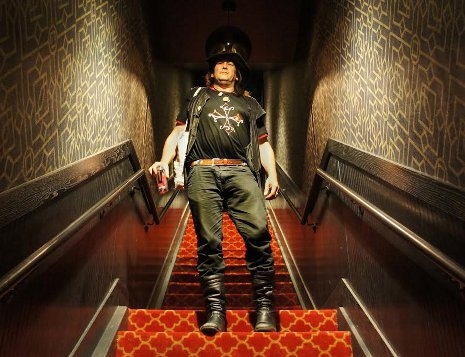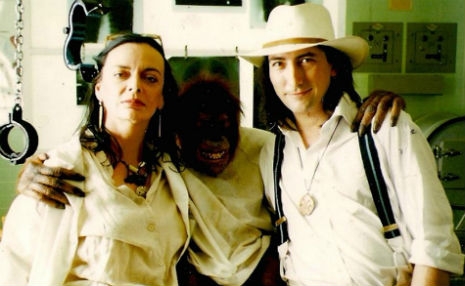
Richard Stanley’s one of the most fascinating human beings I’ve ever met. He’s a divinely demented film maker, necromancer, and pop culture provocateur with a rock & roll heart that beats time to a cosmic rhythm machine redeemed from some post-apocalyptic pawn shop located at the outer edges of absolute reality. He’s got the widescreen stare of a gunslinger in a spaghetti western and more than a few metaphorical bullet holes in his serape. Stanley’s been through some tribulation, the kind that can pulverize a man’s soul into a million little shards of crystallized dogshit. In the mid-90s, while still only in his twenties, this precocious and audacious filmmaker was given the opportunity to make a movie based on his visionary adaption of H. G. Well’s The Island of Dr. Moreau. What followed was a classic example of a young director’s rebel spirit bumping up against old school Hollywood politics and power games. Stanley was not only fucked over by the heads of New Line Cinema, he was also mentally brutalized by the epically malevolent ego of Val Kilmer who he had cast, along with Marlon Brando, in a leading role. Only days after the start of filming, Stanley was fired and banished from the set of his ambitious and potentially ground-breaking movie.
The whole sordid saga of Richard Stanley’s cinematic trial by fire has been documented in the riveting Lost Soul: The Doomed Journey of Richard Stanley’s Island of Dr. Moreau. Directed by David Gregory and released by Severin Films, Lost Soul shares much of the same dark humor, heartbreak and intrigue of Alejandro Jodorowsky’s ill-fated Dune project, as seen in that recent documentary. Stanley, like Jodorowsky, saw his concept appropriated by Hollywood and twisted into something that was to his original vision what rape is to love.

Lost Soul is as entertaining as it is sad and infuriating. Watching studio heads blathering idiotically about a film they didn’t understand and hearing the crew and cast’s disgusted take on Kilmer’s ego-driven subversion of Stanley’s efforts to make the movie his way is a far more dramatic and engaging experience than the Hollywood bomb that was ultimately released.
Eventually, Stanley’s project was handed over to the long past-his-prime director, John Frankenheimer, a hired gun with a dictatorial attitude and almost zero interest in Stanley’s vision for the film. With nothing at stake, Frankenheimer essentially took the money and ran. The film he delivered to the studio was cinematic road kill, dead on arrival. The Island of Dr. Moreau debuted in 1996 to critical jeers and promptly crashed and burned at the box office. I actually went to see it the day it opened in New York City, mostly because of the presence of Brando and David Thewlis in the film. Overall, I hated the movie but loved Brando’s over-the-top, don’t-give-a-fuck performance. You could tell he was intent on enjoying himself despite appearing in what he clearly thought was a steaming pile of shit. I think Brando was also slyly editorializing about the way Stanley’s ideas had been altered and corrupted. He liked Stanley and in my opinion was demonstrating solidarity with the young director who had been exiled from his own film. As far as Kilmer goes, that motherfucker had blown his cred ever since appearing as Jim Morrison in Oliver Stone’s hate letter to rock and roll The Doors. Frankenheimer made no attempt to reel in Kilmer’s narcissism and the end result ain’t pretty. Kilmer spends most of his screen time doing a silly imitation of Brando which is both unfunny and insulting. I’m sure Brando didn’t even notice.
I met with Richard Stanley after a screening of Lost Soul during last year’s Fantastic Fest in Austin. A commanding figure with a delicate grace about him, Stanley was easy to talk to and extremely open about the passion and pain involved in creating a work of art that, had it been realized true to his vision, could have been a glorious thing.

Photo of Richard Stanley by Mirgun Akyavas.
I’m not easily impressed by most human beings these days. Few walk it like they talk it and fewer still are genuinely fearless in pursuit of their dreams, willing to take risks that could end disastrously or triumphantly or a little of both. Richard Stanley is truly an artist/warrior and he’s in the midst of a remarkable and well-deserved return to the public eye. Last week, he was the subject of an Entertainment Weekly cover story (good for you EW). The wheel of karma is spinning back in Stanley’s direction and it’s good.
In the few short hours that I spent talking with and videotaping Richard I felt like I was with a dear old friend. Before he left Austin, we met on the patio of the Alamo Drafthouse where I gave him a copy of Geoff Dyer’s book on Tarkovsky, Zona: A Book About a Film About a Journey to a Room and a small bag of medicinal herb from Northern California. These were not rare or expensive gifts, they were very modest. But Richard responded as though I’d given him precious feathers of an ancient mythological bird. His reaction was so heartfelt, so sweet and unfettered, that I was somewhat taken aback as he tilted his head down and gave me a huge kiss on the cheek. This was a kiss I would have expected from my born again mother after telling her I had gotten engaged to Jesus. Richard clearly liked my gifts. “Shall we smoke it” he asked, referring to the packet of herb in his hand, all the while grinning hugely. In that moment, I saw the face of a man whose spirit is impossible to contain, who will live to his fullest no matter what gets in his way. And that’s the ultimate “fuck you” to the assholes who tried to take him down. I love it when the truly hep cat gets the last laugh.

Lost Soul: The Doomed Journey of Richard Stanley’s Island of Dr. Moreau is currently streaming on Amazon and playing in selected theaters around the world. This coming weekend, February 28, he’ll be appearing onstage at Cinefamily in Los Angeles for a Q&A with the director David Gregory (and again on Tuesday, March 3). You can also catch the film at Nitehawk Cinema in Brooklyn this weekend, 2/27 and 2/28. For more goodness, you can visit Stanley’s website’s Tera Umbra- The Empire Of Shadows and this one here.
I started the camera rolling and let Richard do his thing. His life story is quite marvelous and he’s practically breathless in the telling of it. Among many things, he touches upon his early videos for Fields of the Nephilim, Public Image Limited, his feature-length cult classics Hardware and Dust Devil, Lemmy and Iggy, fighting with rebels in Afghanistan, his abiding love for Fairuza Balk and his home in southern France where he has a magical relationship to the mysterious Château de Montségur.
Watch the trailer:











